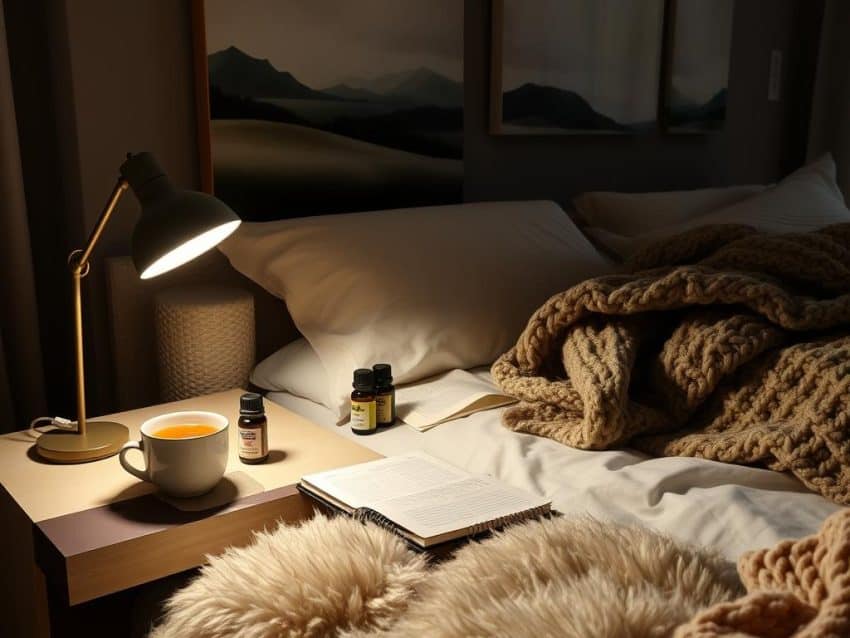Did you know that 70 million adults in the United States suffer from sleep disorders? This shows how important a good night routine is for deep sleep. I’ve learned that a night routine is more than just bedtime. It’s about relaxing and getting ready for sleep.
Adding self-care, like less screen time and calm activities, boosts sleep quality. Getting a good night’s sleep is key for feeling well. Knowing how sleep works helps us make healthier choices.
In this article, we’ll look at the best night routines. These routines help you fall asleep quickly and sleep deeply. Let’s learn how to improve our sleep together.
Key Takeaways
- A structured night routine can significantly improve sleep quality.
- Limiting screen time before bed helps in regulating melatonin production.
- Engaging in relaxing activities, like reading or journaling, aids in winding down.
- Maintaining a cool, dark, and quiet sleeping environment optimizes rest.
- Incorporating self-care practices enhances both sleep hygiene and overall health.
Understanding the Importance of a Healthy Night Routine
Having a healthy night routine is key to better sleep. It helps me relax before bed, making me feel better overall. Just 15 minutes of prep for the next day can reduce stress and clear my mind.
Studies show that a regular bedtime helps my body’s clock work better. This makes it easier to fall asleep and wake up feeling refreshed.
Why Sleep Matters for Overall Well-Being
Good sleep is vital for my well-being. In the U.S., one in three adults don’t get enough sleep. This can cause serious health problems like high blood pressure and obesity.
By focusing on sleep hygiene, I help my body and mind recover. This shows how important sleep is for a healthy life.
The Impact of Sleep Quality on Mental Health
My mental health is closely tied to my sleep quality. Bad sleep can mess with my thinking and increase anxiety and depression. Using relaxation techniques like mindfulness or meditation before bed helps calm my mind.
Journaling can also help quiet my thoughts, making it easier to sleep. These habits help me build mental strength.
How a Night Routine Affects Sleep Quality
A regular night routine boosts my sleep quality. Simple steps like avoiding screens and cutting down on caffeine an hour before bed help. Keeping my room cool and dark also improves sleep.
Doing calming activities like reading or taking a warm bath tells my body it’s time to sleep. This makes falling asleep easier.
Key Elements to Include in Your Night Routine
Creating a good night routine can really improve your sleep quality. There are a few important things to focus on. These help make your sleep space calm and keep your sleep habits healthy.
Setting a Consistent Bedtime
Going to bed at the same time every night is key. It helps your body get into a rhythm. This makes you feel more awake and alert in the morning.
Creating a Relaxing Environment
To make your bedroom relaxing, think about the temperature, light, and sound. Keeping it cool, between 60-67°F, is best for sleep. Use blackout curtains to block out light and choose natural fiber bedding for comfort.
Playing ocean sounds can help block out other noises. This creates a peaceful atmosphere for sleep.
Incorporating Relaxation Techniques
Relaxation techniques are a big part of my night routine. I do deep breathing exercises, like the 4-7-8 method, before bed. Gentle yoga poses, like Child’s Pose, help me relax.
I also journal to clear my mind. Writing about things I’m grateful for helps me feel positive and calm.
Limiting Screen Time Before Bed
It’s important to limit screen time before bed. I try to avoid screens for at least an hour before sleep. Setting my phone to “do not disturb” at 9:30 PM helps.
Blue light from screens can mess with your sleep. Instead, I read a physical book. It helps my mind unwind naturally.

Night Routine Tips for Achieving Deep, Restorative Sleep
Creating a relaxing night routine can help me sleep better. Adding simple practices to my routine can make my nights more peaceful. These tips focus on calming the body and mind, making it easier to fall asleep.
Utilizing a Warm Bath or Shower
A warm bath tells my body it’s time to relax. The heat relaxes my muscles, easing the day’s tension. Stepping out, the cool skin helps me feel sleepy, making it easier to fall asleep.
Engaging in Gentle Stretching or Yoga
Gentle stretching or yoga is great for my evening. It eases muscle stiffness and improves blood flow. Yoga calms my body and mind, preparing me for a good night’s sleep.
Reading for Relaxation and Unwinding
Reading a calming book helps me unwind. It takes my mind off daily stress, creating a peaceful space. The right book can make my bedtime routine more soothing.
Practicing Mindfulness or Meditation
Mindfulness or meditation in my night routine reduces stress. Focusing on my breath or guided meditation clears my mind. This practice helps me sleep deeply, waking up refreshed.
Conclusion
Creating a mindful night routine is key to better sleep. It helps our bodies get the rest they need. By sticking to a routine, I make my bedroom a cozy space to relax.
Practices like stretching and taking magnesium prepare me for sleep. They boost my health and calm my mind. This makes me feel ready for a good night’s rest.
My night routine has changed how I see bedtime. Reading or cuddling with my partner makes me feel calm. Listening to soothing music helps me fall asleep, keeping my goals in mind.
Most U.S. adults focus on getting good sleep. This shows how important a bedtime routine is. By following these steps, I wake up feeling refreshed and ready for the day.
Having a strong night routine can make life more fulfilling. It brings clarity and energy to our daily lives.
